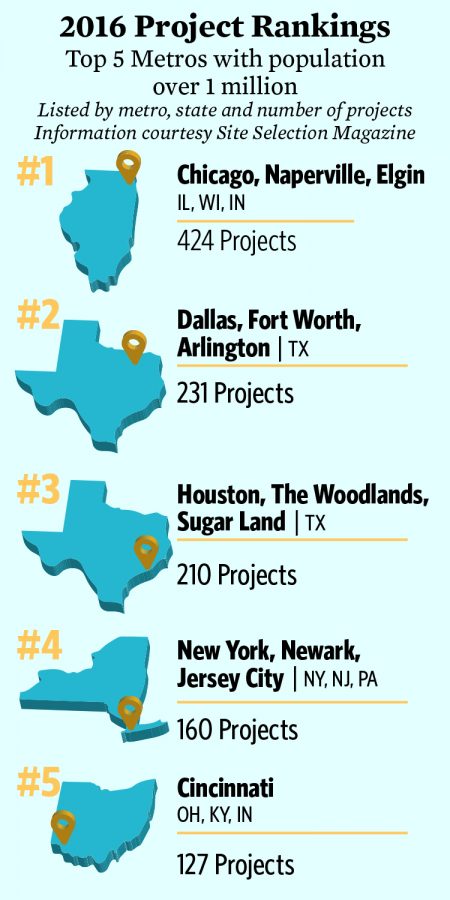Chicago named top city for corporate investment
Chicago named top city for corporate investment
March 13, 2017
For the fourth consecutive year, the Chicagoland area was named the top location for corporate investment by Site Selection magazine, a resource for corporations and investors.
Winning the “top Metro” award from the magazine, which publishes expansion planning information, means the Chicago metropolitan area—including Elgin and Naperville—had more capital investment projects, specifically new or expanded facilities within private sectors, than any other qualifying city in 2016, according to editor-in-chief Mark Arend.
“[The ranking] indicates which areas have been particularly successful in attracting capital investment,” Arend said. “That may be of interest to corporate investors who are looking at which areas are doing well.”
The city reported $2.8 billion in corporate investment and nearly 14,000 new jobs this past year, according to a March 1 press release from the mayor’s office.
Matt Ragas, academic director for the Public Relations and Advertising Graduate Program at DePaul University, said there are many reasons why corporate businesses are attracted to Chicago, such as a successful transportation system, strong neighboring universities, notable cultural institutions and an emerging pool of talent.
“Young people are getting educated both within the state and outside of the Midwest,” Ragas said. “Then, they move to Chicago for their career [because they] want to be in a big urban area.”
McDonald’s and Caterpillar Inc. are prime examples of companies who recently moved their headquarters to Chicago, showing how companies are taking advantage of the city’s resources and talent pool, Ragas said.
Chicago has also been going through a “startup revolution,” and that can be attributed to the nature of the Chicago business scene compared with other major cities, said Jeff Steele, lecturer in the Business & Entrepreneurship Department.
He said this is why he decided to open his business, The 3D Printer Experience, 333 N. LaSalle Drive., in Chicago rather than another city .
“[Los Angeles] was too spread out, New York was too dense [with] too many other distractions,” Steele said. “But [in] downtown Chicago, something like this would pop.”
According to Steele, other key attractions for businesses include the way “Chicago loves Chicago” and will promote its own, which will give a company a better chance to stand out among the other competition.
Ragas said companies are striving to involve diversity inclusion initiatives, and Chicago help provide that opportunity for them.
“Demographics of the country are changing,” Ragas said. “I don’t know of a big company right now that’s not focused on trying to [implement] a more diverse workforce.”
While ranking lists such as Site Selection’s may influence companies’ location decisions, some aspects of Chicago might discourage relocation, including the fiscal health of the city, sales and property taxes and the city’s high crime rates, according to Ragas.
“When people think about Chicago right now, [they ask], ‘What would be the environment in terms of crime?’” Ragas said. “What is the perception people have of the city in terms of is this going to be a safe place?”
In order to maintain its title, Ragas said the city must continue to make businesses feel as if coming to Chicago was the right investment for their future.
“There needs to be positive experiences for these businesses,” he said. “If we’re going to continue to have this momentum of business, then [they] have to feel the city of Chicago can make improvements to its finances.”








